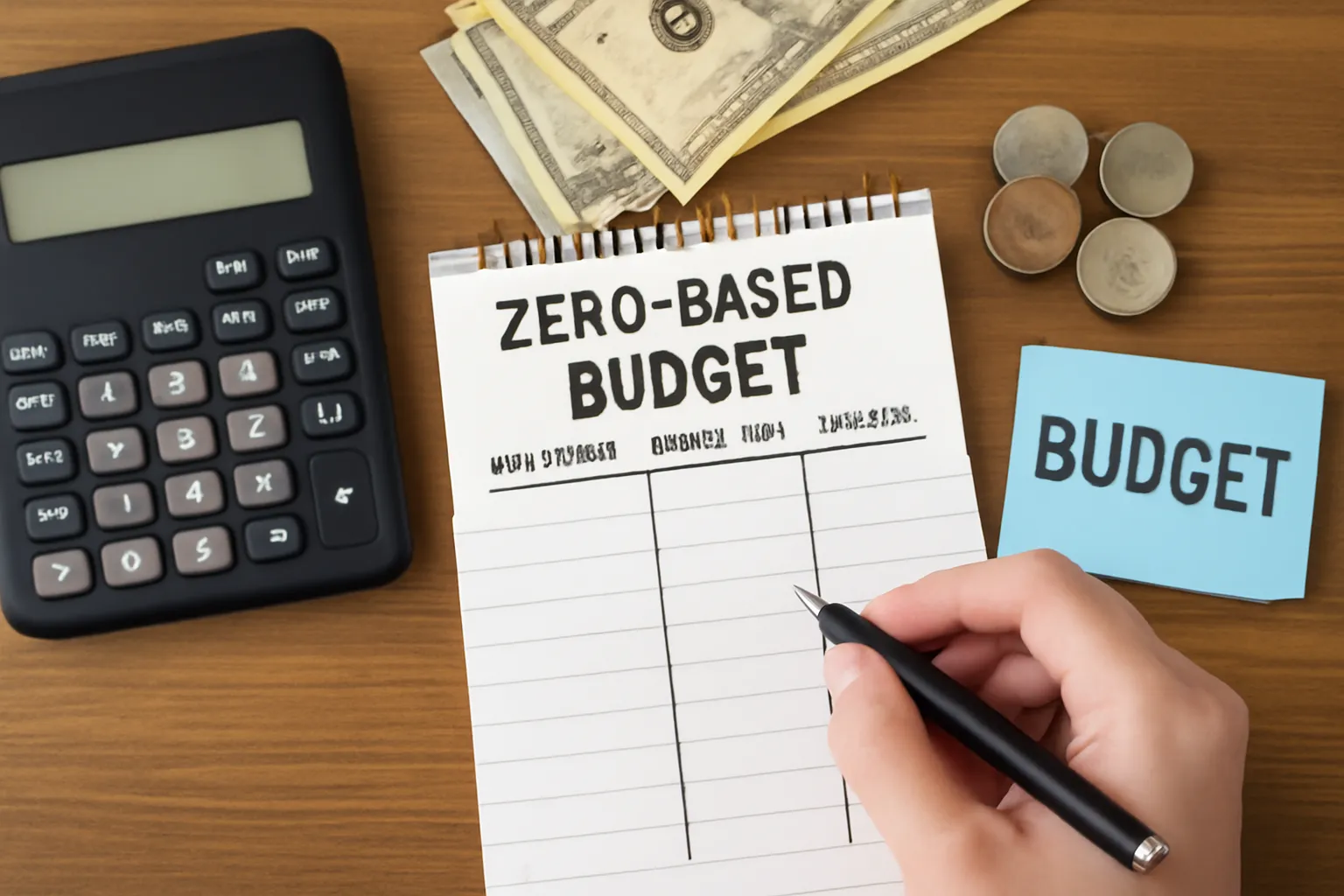Introduction to Zero-Based Budgeting
In the ever-evolving landscape of personal finance, individuals and families are constantly seeking innovative strategies to maximize their income, reduce unnecessary expenses, and achieve financial freedom. One such strategy that has gained significant traction in recent years is Zero-Based Budgeting (ZBB). Unlike traditional budgeting methods that rely on previous spending patterns, Zero-based budgeting starts from scratch each month, compelling you to assign every dollar a specific purpose. In this comprehensive guide, we will explore the fundamentals, benefits, challenges, and actionable steps to implement zero-based budgeting in 2024, ensuring you are well-equipped to take charge of your financial destiny.
What is Zero-Based Budgeting?
Zero-based budgeting is a meticulous approach to managing your finances where every dollar of your income is allocated to specific expenses, savings, or debt repayment, leaving your budget with a “zero” balance at the end of the month. This does not mean you spend all your money, but rather, you give every dollar a “job.” The concept was initially developed for businesses but has proven to be equally powerful for personal financial management.
At its core, zero-based budgeting requires you to justify every expense, regardless of whether it was part of last month’s budget. This forces a level of intentionality and awareness that is often missing in other budgeting methods, such as the envelope system or the 50/30/20 rule.
How Zero-Based Budgeting Differs from Traditional Budgeting
- Traditional Budgeting: Allocates funds based on past spending habits, often rolling over unspent money or categories from previous months.
- Zero-Based Budgeting: Starts from zero each month, requiring you to allocate your income intentionally to every category until no money is left unassigned.
Why Zero-Based Budgeting is the Ultimate Tool for 2025
The year 2024 brings with it a complex financial environment—rising inflation, unpredictable markets, and the increasing importance of financial literacy. Zero-based budgeting is uniquely positioned to help you thrive in these conditions because it:
- Prevents overspending by making you accountable for every dollar.
- Boosts savings by ensuring that savings goals are prioritized each month.
- Increases financial awareness and helps you identify wasteful spending.
- Improves debt management by allocating funds to debt repayment in a structured way.
The Core Principles of Zero-Based Budgeting
To successfully implement zero-based budgeting, it is essential to understand its core principles. These principles serve as the foundation for all zero-based budget strategies, whether you are an individual, a couple, or a family.
Every Dollar Has a Job
The most important tenet of zero-based budgeting is that every dollar must be assigned a purpose. This means that after accounting for all your expenses, savings, and debt payments, your income minus your outgo should equal zero.
Monthly Reset
With zero-based budgeting, each month is a fresh start. You do not carry over last month’s budget; instead, you re-evaluate your financial goals and needs, ensuring your budget remains aligned with your current situation.
Active Decision-Making
Unlike passive budgeting, zero-based budgeting requires you to make active decisions about where your money goes. This intentionality leads to better financial outcomes and a greater sense of control.
Step-by-Step Guide to Implementing Zero-Based Budgeting
Now that you understand the principles, let’s break down the step-by-step process for creating a zero-based budget in 2025. Whether you are new to budgeting or looking to refine your current system, these steps will set you on the path to financial mastery.
1. Calculate Your Monthly Income
- Include all sources of income: salary, freelance work, side hustles, rental income, and any other money coming in.
- Use net (take-home) income, not gross, to avoid overestimating your available funds.
2. List All Your Expenses
- Start with fixed expenses: rent/mortgage, utilities, insurance, loan payments.
- List variable expenses: groceries, transportation, entertainment, dining out, etc.
- Don’t forget irregular or annual expenses: subscriptions, car maintenance, gifts, etc.
3. Prioritize Savings and Debt Repayment
- Allocate funds to emergency savings, retirement accounts, or other savings goals before discretionary spending.
- Dedicate a portion of your budget to paying off high-interest debt.
4. Assign Every Dollar a Job
- Start with essentials, then move to savings, debt, and finally, wants.
- Continue allocating funds until your income minus expenses equals zero.
5. Track Your Spending
- Use budgeting apps, spreadsheets, or pen and paper to monitor every transaction.
- Adjust your allocations if you overspend in a category, taking funds from less critical areas.
6. Review and Adjust Monthly
- At the end of each month, review your spending, savings, and progress toward goals.
- Adjust your next month’s budget to reflect any changes in income, expenses, or priorities.
Benefits of Zero-Based Budgeting
Zero-based budgeting offers a host of advantages that can transform your relationship with money and help you achieve your financial goals faster. Here are some of the most compelling benefits:
Increased Financial Awareness
By assigning every dollar a purpose, you become more conscious of your spending habits. This awareness can reveal areas where you might be wasting money and help you redirect those funds to more meaningful uses.
Better Control Over Your Finances
Zero-based budgeting gives you complete control over your money. Since you decide where each dollar goes, you are less likely to succumb to impulse purchases or financial drift.
Accelerated Savings and Debt Repayment
Because savings and debt repayment are built into your budget from the start, you are more likely to make progress on your financial goals. Over time, this can lead to financial independence and a greater sense of security.
Adaptability to Life Changes
Life is unpredictable, and your financial needs can change rapidly. Zero-based budgeting is flexible enough to accommodate changes in income, unexpected expenses, or new priorities, making it an ideal choice for today’s dynamic world.
Common Challenges and How to Overcome Them
While zero-based budgeting is a powerful tool, it is not without its challenges. Understanding these obstacles and knowing how to address them will help you stick with your budget and reap the rewards.
Challenge 1: It’s Time-Consuming
Creating a zero-based budget can be more time-intensive than other methods, especially in the beginning. To overcome this:
- Automate where possible using budgeting apps.
- Set aside a specific time each week to review and update your budget.
- Remember that the time investment pays off in increased financial clarity.
Challenge 2: Irregular Income
If your income fluctuates month-to-month, it can be challenging to allocate funds precisely. To manage this:
- Base your budget on your lowest expected monthly income.
- Create a “buffer” category to absorb income variability.
- Adjust your allocations as soon as you know your actual income for the month.
Challenge 3: Unexpected Expenses
Emergencies or unplanned expenses can derail your budget. To mitigate this:
- Build an emergency fund as a priority.
- Include a “miscellaneous” category in your budget for unforeseen costs.
- Be prepared to reallocate funds from less critical categories as needed.
Zero-Based Budgeting for Different Lifestyles
Zero-based budgeting is not a one-size-fits-all approach. It can be tailored to suit various lifestyles and financial situations, including singles, couples, families, and even students.
Singles
For individuals, zero-based budgeting offers a clear roadmap to financial independence. By prioritizing savings and debt repayment, singles can quickly build a strong financial foundation.
Couples
Couples can use zero-based budgeting to align their financial goals and ensure both partners are on the same page. Regular budget meetings and open communication are key to success.
Families
Families often have more complex financial needs, including childcare, education, and extracurricular activities. Zero-based budgeting helps families allocate resources efficiently and plan for future expenses.
Students
Students can benefit from zero-based budgeting by managing limited resources, minimizing debt, and building good financial habits early in life.
Zero-Based Budgeting Tools and Apps for 2025
Technology has made it easier than ever to implement and stick to a zero-based budget. Here are some of the top tools and apps for 2025:
- YNAB (You Need A Budget): Specifically designed for zero-based budgeting, with intuitive features for tracking and adjusting your budget.
- EveryDollar: A straightforward app that helps you create a zero-based budget quickly and easily.
- Mint: While not exclusively for zero-based budgeting, Mint allows for detailed tracking and customization.
- Spreadsheets: For those who prefer a hands-on approach, customizable Excel or Google Sheets templates can be powerful tools.
Zero-Based Budgeting in Business and Organizations
While this guide focuses primarily on personal finance, it is worth noting that zero-based budgeting originated in the corporate world. Many organizations use ZBB to:
- Eliminate redundant expenses.
- Justify every budget line item each fiscal year.
- Increase operational efficiency.
- Align spending with strategic priorities.
The principles are the same: start from zero, justify every expense, and allocate resources intentionally.
Zero-Based Budgeting vs. Other Budgeting Methods
To truly appreciate the power of zero-based budgeting, it is helpful to compare it to other popular budgeting methods:
- Envelope System: Uses physical envelopes for each spending category. Effective for cash management but less flexible for digital transactions.
- 50/30/20 Rule: Allocates 50% to needs, 30% to wants, and 20% to savings/debt. Simpler, but may not provide the granularity or accountability of zero-based budgeting.
- Incremental Budgeting: Bases new budgets on previous spending, making only incremental changes. Risks perpetuating bad habits and inefficiencies.
Zero-based budgeting stands out for its precision, accountability, and adaptability.
Pro Tips for Mastering Zero-Based Budgeting
- Be honest about your spending habits—accurate data is key.
- Review your budget weekly to catch issues early and make adjustments.
- Automate savings and bill payments to ensure you stick to your allocations.
- Celebrate milestones to stay motivated, such as paying off a credit card or reaching a savings goal.
- Involve your family or partner in the budgeting process for accountability and shared success.
Zero-Based Budgeting Success Stories
Many people have transformed their financial lives using zero-based budgeting. Here are a few examples:
- Sarah, a single mom, paid off $20,000 in debt in two years by assigning every dollar to a specific category and cutting unnecessary expenses.
- The Johnson family built a six-month emergency fund in just 18 months by prioritizing savings and sticking to their zero-based budget.
- Mike, a recent college graduate, avoided lifestyle inflation and started investing early by following a zero-based budget from his first paycheck.
Frequently Asked Questions About Zero-Based Budgeting
- Is zero-based budgeting only for people with high incomes?
No, zero-based budgeting works for any income level. In fact, it can be even more beneficial for those with limited resources because it ensures that every dollar is used intentionally.
- Do I need to use cash envelopes to do zero-based budgeting?
No, while cash envelopes can help some people control spending, you can use digital tools, apps, or spreadsheets just as effectively.
- What if my expenses change mid-month?
Zero-based budgeting is flexible—simply reallocate funds from less important categories to cover new expenses, ensuring your budget still totals zero.
- How often should I update my budget?
At a minimum, update your budget monthly. However, weekly check-ins are recommended to catch issues early and stay on track.
Conclusion: Take Control of Your Financial Future in 2025
Zero-based budgeting is more than just a method—it is a mindset. By starting from zero each month and assigning every dollar a job, you gain unprecedented control over your finances. In the uncertain economic climate of 2025, this level of intentionality and adaptability is more important than ever.
Whether you are looking to get out of debt, save for a major goal, or simply gain peace of mind, zero-based budgeting can be your ultimate financial ally. Start today, stick with it, and watch as your financial dreams become reality.

